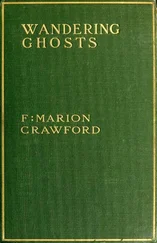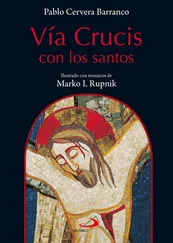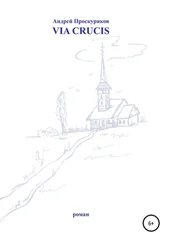F. Crawford - Via Crucis
Здесь есть возможность читать онлайн «F. Crawford - Via Crucis» весь текст электронной книги совершенно бесплатно (целиком полную версию без сокращений). В некоторых случаях можно слушать аудио, скачать через торрент в формате fb2 и присутствует краткое содержание. Жанр: Исторические приключения, на английском языке. Описание произведения, (предисловие) а так же отзывы посетителей доступны на портале библиотеки ЛибКат.
- Название:Via Crucis
- Автор:
- Жанр:
- Год:неизвестен
- ISBN:нет данных
- Рейтинг книги:3 / 5. Голосов: 1
-
Избранное:Добавить в избранное
- Отзывы:
-
Ваша оценка:
- 60
- 1
- 2
- 3
- 4
- 5
Via Crucis: краткое содержание, описание и аннотация
Предлагаем к чтению аннотацию, описание, краткое содержание или предисловие (зависит от того, что написал сам автор книги «Via Crucis»). Если вы не нашли необходимую информацию о книге — напишите в комментариях, мы постараемся отыскать её.
Via Crucis — читать онлайн бесплатно полную книгу (весь текст) целиком
Ниже представлен текст книги, разбитый по страницам. Система сохранения места последней прочитанной страницы, позволяет с удобством читать онлайн бесплатно книгу «Via Crucis», без необходимости каждый раз заново искать на чём Вы остановились. Поставьте закладку, и сможете в любой момент перейти на страницу, на которой закончили чтение.
Интервал:
Закладка:
There were multitudes without order, there were kings without authority, there were leaders more fit to follow than to head the van. And always, when he had preached and breathed fire through the dry stubble of men's parched hopes, till the flame was broad and high and resistless, there came to him, in the solitude wherein he found no rest, the deadly memory of the Hermit's blasted host, overtaken, overcome, crushed to a heap of bones in one wild battle with the Seljuk horde.
Many a time he told himself that Peter had been no soldier, that stronger and wiser men had won what he had failed even to see, and that the memories of Godfrey's fearful wrath, of Raymond's brave wisdom, and of Tancred's knightly deeds were more than half another victory gained. Yet always, too, in his deep intuition of men's limits, he felt that the soldiers of his day were not those great knights who had humbled the Emperor of the East and taught a lesson of fear to Kilidj Arslan, and who had grasped the flowers of Syria and Palestine with iron hands. It was indeed God's will that a great host should go forth again, but neither Bernard nor any other man could surely tell that in the will of Heaven there was victory too. The first to win or die must always and ever be the first alone; those who come after them imitate them, profit by them, or find ruin sown in the ravaged track of conquest; do what they may, believe as they can, be their faith ever so high and pure, they can never feel the splendid exultation of the soul that has found out some godlike and untried deed to do.
The times had changed in forty years. The modern world is turned by the interests of the many, but the world of old revolved about the ambitions of the few, and the transition began in Bernard's day after the furnace of the eleventh century had poured its molten material out upon the world to settle and cool again in the castings of nations, separate and individual. There was less impulse, more rigidity; here and there, there was more strength, but everywhere there was less fire; and as interests grew in opposite directions and solidified apart, the chances of any universal rising or joint battle for belief grew less. Mankind moves westward with the sun; men's thoughts turn back to the bright East, the source of every faith that moves humanity; at first, for faith's sake, men may retrace their migration to its source and give their own blood for their holy places; and after them a generation will give its money for the honour of its God; but at the last, and surely, comes the time of memory's fading, the winter of belief, the night of faith's day, wherein a delicately nurtured and greedy race will give neither gold nor blood, but only a prayer or a smile for the hope of a life to come.
Gilbert Warde began the great march, as some others did, in earnest trust and belief. He had struck blows in self-defence, and for vengeance; he had fought once in Italy for sheer love of fighting and the animal joy of the strong northerner in cut and thrust, and lately, at Vezelay, he had fought a herd of drunken brutes for a woman's safety; but he had not known the false and fierce delight of killing men to please God. That was still before him, and he looked forward to it with that half-deadly, half-voluptuous longing for bloodshed sanctioned and sanctified by justice or religion, which is at the main root of every soldier's nature, let men say what they will.
When the Crusade began its pilgrimage of arms, Gilbert had not yet seen Beatrix, nor had he any distinct proof, even by the Queen's word, that she was really in France. Eleanor herself had kept him at a distance during the months that elapsed between Bernard's preaching at Vezelay and the departure of the host; and he had been much alone, being more knight than squire, and yet not having knighthood, because he would not ask it of the Queen, since that would have seemed like begging for a reward, and she did not offer it freely, while the King, of course, knew nothing of what had taken place. One night, as he sat alone in his chamber, a man entered, cloaked and hooded, and laid before him something heavy wrapped in a silk kerchief that might have been a woman's; and the man went out quickly before Gilbert had thought of asking a question. In the kerchief there was a purse of gold, which indeed he sorely needed, and yet after the man was gone he sat stupidly staring at the contents for a long time. At first it seemed to him almost certain that the money came from the Queen; but as he remembered her coldness ever since the riot at Vezelay, and recollected how many times he had of late tried to attract her attention without success, the conviction lost ground, and he began to believe it possible, if not certain, that the gift had proceeded from another source. As men did in those days, and as many would do now, he might have taken thankfully such fortune as he found in his path, not inquiring too closely whether he had deserved it or not. But yet he hesitated, and then, turning the thing over, he saw on the seal the device of the Abbot of Sheering, and he thanked Heaven for such a friend. And again, as living much alone made him more prone to self-questioning, he asked himself whether he had ever loved Beatrix at all. He heard men talk of love, he heard men sing the love-songs of a passionate and earnest age, and it seemed to him that he could nowhere find in his heart or soul the chords that should answer directly to that music. In him the memory was a treasure rather than a power; and while he loved to dream himself again through the pleasant passages of youth, calling up the kind and girlish face that was always near him in shadow-land, and although the image came, and he heard the voice and could almost fancy that he touched the little hand, yet it was all soft rather than vivid, it was full of tenderness rather than of a cruel and insatiate longing, it was a satisfaction rather than a desire. And therefore, though the mere name of Beatrix had been enough to bring him back from Rome, and though he had asked many questions in the hope of seeing her, he attempted nothing daring in order to be assured of the truth.
Then came the final preparations, the testing of armour, the providing of small things necessary on the march, the renewal of saddle and bridle, and all the hundred details which every knight and soldier in those days understood and cared for himself. Then the first march eastward through a changing country which Gilbert had not yet seen, the encampment upon the heights about Metz, the days spent in roaming over the old city, long ago a fortress of the Romans-and during all that time Gilbert scarcely caught a glimpse of the Queen, though he saw the King often at religious functions in the lately built church of Saint Vincent; for as yet the great cathedral was not even begun. Last of all, on the morning of the final departure the royal armies assembled before dawn at the church, the court and the greater knights within, the vast concourse of men-at-arms and footmen and followers in the open air outside. But Gilbert passed boldly in among the high nobles of France and Guienne, and knelt with them in the dim nave, where little oil-lamps hung under the high vaults, and many candles burned upon the altars in the side-chapels, shedding a soft light on dark faces and mailed breasts and rich mantles. Out of the dusky choir rang the high plain-chant of monks and singing-boys, from the altar the bishop's voice alone intoned the Preface of the Holy Cross, and presently, in the deep silence, the Sacred Host was lifted high, and then the golden chalice.
The King and Queen knelt side by side to receive the holy bread, and after them the nobles and the knights in turn went up to communicate, in long procession, while the day dawned through the clerestory windows high overhead, and the King and Queen knelt all the time with folded hands till the mass was over. Then at last the standard of the cross was brought forth, with the great standards of France and of Guienne— the banner of Saint George and the Dragon, which Eleanor was to hand down to her sons and sons' sons, kings of England, for generations; and the choir began to sing "Vexilla regis prodeunt" ("The standards of the king go forth"). So all that great and noble host went out in state, chanting the lofty hymn that rang with tones of victory, while among cypress groves on far Asian hillsides the ravens waited for the coming feast of Christian flesh, and the circling kite scanned the broad earth and dancing water for the living things that were to feed him full of death.
Читать дальшеИнтервал:
Закладка:
Похожие книги на «Via Crucis»
Представляем Вашему вниманию похожие книги на «Via Crucis» списком для выбора. Мы отобрали схожую по названию и смыслу литературу в надежде предоставить читателям больше вариантов отыскать новые, интересные, ещё непрочитанные произведения.
Обсуждение, отзывы о книге «Via Crucis» и просто собственные мнения читателей. Оставьте ваши комментарии, напишите, что Вы думаете о произведении, его смысле или главных героях. Укажите что конкретно понравилось, а что нет, и почему Вы так считаете.










